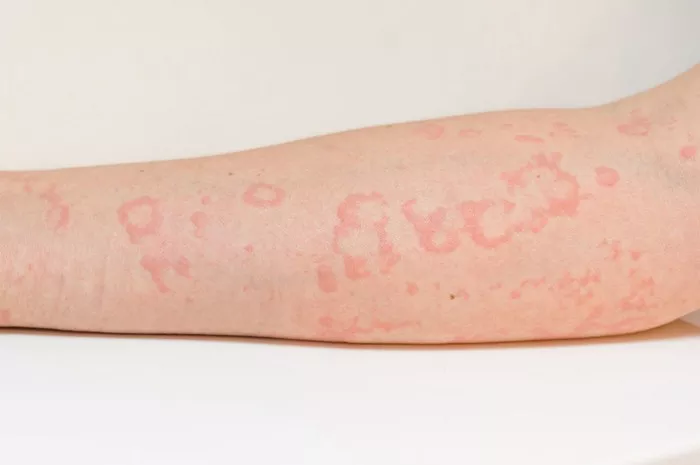Hives, medically known as urticaria, are a common skin condition characterized by red, itchy welts that can appear anywhere on the body. They often result from an allergic reaction but can also be triggered by stress, infections, or certain medications. While many people turn to conventional treatments like antihistamines and corticosteroids, there is growing interest in natural remedies for managing hives. This article delves into various natural approaches to alleviate the discomfort associated with hives, offering insights into their effectiveness and practical application.
What Causes Hives?
Before exploring natural remedies, it’s crucial to understand the potential causes of hives. Hives occur when histamine and other chemicals are released from under the skin’s surface, often due to an allergic reaction. Common triggers include:
- Food Allergies: Nuts, shellfish, eggs, and dairy products are frequent culprits.
- Medications: Antibiotics, aspirin, and nonsteroidal anti-inflammatory drugs (NSAIDs) can induce hives.
- Infections: Viral infections, such as the common cold, and bacterial infections can trigger hives.
- Environmental Factors: Pollen, pet dander, insect bites, and extreme temperatures.
- Stress: Emotional stress can exacerbate the condition.
Identifying the specific cause of hives can be challenging but is essential for effective management.
Natural Remedies for Hives
1. Cold Compresses
Applying cold compresses is a simple yet effective way to alleviate the itching and swelling associated with hives.
Cold temperatures help constrict blood vessels and reduce the release of histamine into the skin. To use this remedy:
- Wrap ice cubes in a cloth or use a cold pack.
- Apply the compress to the affected area for 10-15 minutes.
- Repeat several times a day as needed.
This method provides immediate relief from itching and can significantly reduce the severity of hives.
2. Oatmeal Baths
Oatmeal is renowned for its soothing properties and is a popular remedy for various skin conditions, including hives.
Oatmeal contains compounds like avenanthramides that have anti-inflammatory and antioxidant effects, helping to calm irritated skin. Here’s how to prepare an oatmeal bath:
- Grind one cup of plain oatmeal into a fine powder.
- Add the oatmeal powder to a lukewarm bath.
- Soak in the bath for 15-20 minutes.
- Gently pat the skin dry afterward.
Regular oatmeal baths can help soothe itching and reduce the appearance of hives.
3. Aloe Vera
Aloe vera is another natural remedy with well-documented benefits for skin health.
Known for its anti-inflammatory and healing properties, aloe vera can provide relief from hives. To use aloe vera:
- Extract the gel from a fresh aloe vera leaf.
- Apply the gel directly to the hives.
- Leave it on for 20-30 minutes before rinsing off with lukewarm water.
- Repeat 2-3 times daily.
Aloe vera not only soothes itching but also promotes the healing of the skin.
SEE ALSO: What Autoimmune Disease Can Cause Hives
4. Herbal Teas
Certain herbal teas have antihistamine and anti-inflammatory properties that can help manage hives.
Notable examples include:
- Chamomile Tea: Chamomile has natural antihistamine effects and can reduce inflammation.
- Green Tea: Rich in antioxidants, green tea can help calm the immune system.
- Nettle Tea: Nettle acts as a natural antihistamine and can alleviate allergic reactions.
To prepare herbal tea:
- Steep the chosen herbal tea bag in hot water for 5-10 minutes.
- Drink the tea 2-3 times a day for best results.
Herbal teas not only help reduce the symptoms of hives but also support overall health.
5. Coconut Oil
Coconut oil is a versatile remedy with antimicrobial and anti-inflammatory properties.
Applying coconut oil to hives can provide a protective barrier on the skin and reduce irritation. To use coconut oil:
- Apply a thin layer of virgin coconut oil to the affected area.
- Leave it on for at least 30 minutes.
- Rinse off with lukewarm water if necessary, though it can be left on the skin as well.
Coconut oil moisturizes the skin and can help reduce the discomfort of hives.
6. Apple Cider Vinegar
Apple cider vinegar (ACV) is a popular home remedy with numerous health benefits, including its ability to soothe hives.
ACV has anti-inflammatory properties and can help restore the skin’s natural pH balance. Here’s how to use ACV:
- Mix equal parts of apple cider vinegar and water.
- Apply the solution to the hives using a cotton ball.
- Leave it on for 15-20 minutes before rinsing off.
- Use this remedy once or twice daily.
For those with sensitive skin, it’s advisable to do a patch test first to ensure there’s no adverse reaction.
7. Baking Soda
Baking soda is another common household item that can provide relief from hives.
Its alkaline nature helps neutralize the skin’s pH, reducing itching and inflammation. To use baking soda:
- Mix one tablespoon of baking soda with enough water to form a paste.
- Apply the paste to the hives.
- Leave it on for 10-15 minutes before rinsing off with lukewarm water.
- Repeat once or twice a day.
This simple remedy can significantly reduce the discomfort associated with hives.
8. Dietary Changes
Certain foods and nutrients can either trigger or alleviate hives, making dietary adjustments a key component of natural management.
- Avoid Trigger Foods: Identify and eliminate foods that trigger hives. Common allergens include nuts, shellfish, dairy, and eggs.
- Incorporate Anti-Inflammatory Foods: Foods rich in omega-3 fatty acids, such as salmon, flaxseeds, and walnuts, can help reduce inflammation.
- Increase Antioxidant Intake: Fruits and vegetables like berries, spinach, and kale are high in antioxidants, which support the immune system.
- Stay Hydrated: Drinking plenty of water helps flush out toxins and supports overall skin health.
Consulting with a nutritionist can provide personalized dietary recommendations to manage hives effectively.
9. Stress Management
Emotional stress is a known trigger for hives, making stress management techniques an essential part of natural treatment.
Effective methods include:
- Mindfulness Meditation: Practicing mindfulness can reduce stress and improve emotional well-being.
- Yoga: Regular yoga practice helps manage stress and promotes relaxation.
- Breathing Exercises: Deep breathing exercises can calm the nervous system and reduce stress levels.
Incorporating these practices into daily life can help prevent stress-induced hives.
SEE ALSO: What Helps with Stress Hives
10. Essential Oils
Certain essential oils have therapeutic properties that can alleviate the symptoms of hives.
Popular choices include:
- Lavender Oil: Known for its calming effects, lavender oil can reduce itching and inflammation.
- Tea Tree Oil: With its antimicrobial properties, tea tree oil can prevent infections and soothe irritated skin.
- Peppermint Oil: The cooling sensation of peppermint oil can provide relief from itching.
To use essential oils:
- Dilute a few drops of essential oil in a carrier oil, such as coconut or olive oil.
- Apply the mixture to the hives.
- Leave it on for 20-30 minutes before rinsing off.
Always perform a patch test before using essential oils to ensure there’s no adverse reaction.
11. Probiotics
Probiotics, beneficial bacteria that support gut health, can also play a role in managing hives.
A healthy gut microbiome is crucial for a balanced immune response. Incorporating probiotics into your diet can help:
- Yogurt: Choose plain, unsweetened yogurt with live cultures.
- Kefir: A fermented milk drink rich in probiotics.
- Sauerkraut and Kimchi: Fermented vegetables that provide beneficial bacteria.
Probiotic supplements are also available and can be taken daily to support gut health and potentially reduce the frequency and severity of hives.
Conclusion
Natural remedies offer a holistic approach to managing hives, addressing both the symptoms and underlying causes. While these remedies can provide significant relief, it’s important to remember that individual responses may vary. Consulting with a healthcare provider before starting any new treatment, especially if you have underlying health conditions or are taking medications, is always recommended. By combining these natural remedies with a healthy lifestyle and stress management techniques, individuals can effectively manage hives and improve their overall well-being.
Related Topics:


























